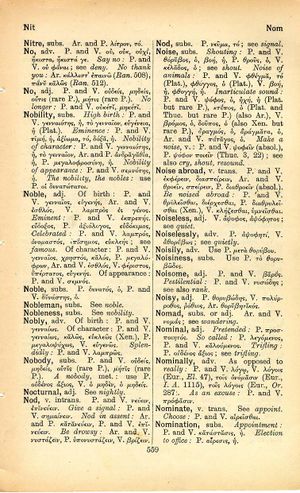nobility: Difference between revisions
From LSJ
πρὸ τελευτῆς μὴ μακάριζε μηδένα, καὶ ἐν τέκνοις αὐτοῦ γνωσθήσεται ἀνήρ → Count no man blessed before his end; a man will be recognized in his offspring. (Ecclesiasticus 11:28)
(CSV4) |
m (Woodhouse1 replacement) |
||
| Line 1: | Line 1: | ||
{{Woodhouse1 | {{Woodhouse1 | ||
|Text=[[File:woodhouse_559.jpg|thumb|link={{filepath:woodhouse_559.jpg}}]] | |Text=[[File:woodhouse_559.jpg|thumb|link={{filepath:woodhouse_559.jpg}}]] | ||
===substantive=== | |||
[[high birth]]: [[prose|P.]] and [[verse|V.]] [[γενναιότης]], ἡ, [[τὸ γενναῖον]]. [[εὐγένεια]], ἡ ([[Plato]]). | |||
[[eminence]]: [[prose|P.]] and [[verse|V.]] [[τιμή]], ἡ, [[ἀξίωμα]], τό, [[δόξα]], ἡ. | |||
[[nobility of character]]: [[prose|P.]] and [[verse|V.]] [[γενναιότης]], ἡ, [[τὸ γενναῖον]], [[Aristophanes|Ar.]] and [[prose|P.]] [[ἀνδραγαθία]], ἡ, [[prose|P.]] [[μεγαλοφροσύνη]], ἡ. | |||
[[nobility of appearance]]: [[prose|P.]] and [[verse|V.]] [[σεμνότης]], ἡ. | |||
[[the nobility]], [[the nobles]]: use [[prose|P.]] [[οἱ δυνατώτατοι]]. | |||
}} | }} | ||
Revision as of 08:52, 20 May 2020
English > Greek (Woodhouse)
substantive
high birth: P. and V. γενναιότης, ἡ, τὸ γενναῖον. εὐγένεια, ἡ (Plato).
eminence: P. and V. τιμή, ἡ, ἀξίωμα, τό, δόξα, ἡ.
nobility of character: P. and V. γενναιότης, ἡ, τὸ γενναῖον, Ar. and P. ἀνδραγαθία, ἡ, P. μεγαλοφροσύνη, ἡ.
nobility of appearance: P. and V. σεμνότης, ἡ.
the nobility, the nobles: use P. οἱ δυνατώτατοι.

